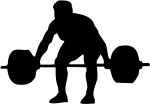- FreeTrainers.com Forums
- Strength & Powerlifting
- Tension vs. Flexion
Group: Strength & Powerlifting
Created: 2012/01/01,
Members: 39,
Messages: 16459
Discuss the topic of Power lifting, Strength training and Strong Man training!
Join group
Tension vs. Flexion

Tinnuk
Posts:
291
Joined: 2005/12/19  |
2008/01/22, 03:43 PM
That's what I thought. I was wondering if it was possible for a muscle to contract isometrically in the absence of resistance, I didn't think so.
|
|
| |

Tinnuk
Posts:
291
Joined: 2005/12/19  |
2008/01/22, 06:19 PM
I've found some terms in some books by Tsatsouline that might make my confusion here a tad more articulate.
The law of reciprocal inhibition dictates that during a muscle's contraction, it's antagonist muscle will relax to prevent it from ?fighting? the agonist. Irradiation, the idea that a neural impulse sent to a muscle will activate adjacent muscles, could suggest though that it would be activated anyways... In the case of single joint exercises, would irradiation be trumped by the reciprocal inhibition? Apparently in multi-joint movements, such as the deadlift, the contractions of the antagonists actually synergize with the agonists and help the movement; is this true? In multi-joint exercises, does reciprocal inhibition stop working? This is driving me pretty f***ing crazy, so any input would be greatly appreciated! If I haven't made myself clear, just say. |

Tinnuk
Posts:
291
Joined: 2005/12/19  |
2008/01/19, 07:25 PM
Why is it that one can acheive relatively high levels of muscular tension without necessarily flexing?
|

wrestler125
Posts:
4,619
Joined: 2004/01/27  |
2008/01/20, 11:11 AM
Flexion is only a term for the movement caused by a muscle. Bringing your hand up by using your bicep is flexion. Add weight, and this is tension as well. However, bring your hand down by extending at the elbow, and we have extension, the opposite of flexion, but we still have tension.
Not sure if this is what you meant. Out of context, it's an ambiguous question. -------------- SQUAT MORE ~Jesse Marunde Blood Guts Sweat Chalk |

merrillj
Posts:
197
Joined: 2007/06/28  |
2008/01/20, 11:25 AM
I don't think that you can create muscular tension without voluntary flexion. Except in the case of outside electrical current.
|

merrillj
Posts:
197
Joined: 2007/06/28  |
2008/01/20, 11:26 AM
Or reflex, which would be involutary.
|

Tinnuk
Posts:
291
Joined: 2005/12/19  |
2008/01/20, 08:03 PM
Let's say that I was to do a curl for instance; during the positive phase of the lift, the triceps are tense even though they're not flexing (otherwise you'd be fighting them to lift the weight).
|

Tinnuk
Posts:
291
Joined: 2005/12/19  |
2008/01/20, 08:05 PM
Well in the case of the triceps, extending.
|

bigandrew
Posts:
5,146
Joined: 2002/10/21  |
2008/01/20, 10:40 PM
tricep has to relax for the bicep to flex(curl)..muscles can't push. They may help stablize the joint tho.
-------------- \\"The eight laws of learning are explanation, demonstration, imitation, repetition, repetition, repetition, repetition, and repetition\\" |

wrestler125
Posts:
4,619
Joined: 2004/01/27  |
2008/01/21, 08:45 PM
Then you're doing something wrong... Unless they are being used while you are curling as a stabilizer, in which case they are creating an extension moment (what you seem to call flexion). This is how the body works. That is why when a bodybuilder poses, they can't just flex the muscles at one side, since that would create an unbalanced moment which would cause the limb to move.
As for electrical current, electrical current does cause movement. Uncontrollable movement in some cases. In ergo the other day we were playing with the electro-stimulator and there was no way to resist it from closing your hand when it was placed on the forearm flexors. The only exception is to voluntarily flex the opposite muscles (extensors) with enough force to equalize it. ============ Quoting from Tinnuk: Let's say that I was to do a curl for instance; during the positive phase of the lift, the triceps are tense even though they're not flexing (otherwise you'd be fighting them to lift the weight). ============= -------------- SQUAT MORE ~Jesse Marunde Blood Guts Sweat Chalk |

merrillj
Posts:
197
Joined: 2007/06/28  |
2008/01/21, 08:49 PM
When you do a curl you do not feel tension in your triceps anyway. You asked about "high levels of muscular tension without necessarily flexing?" How does a bicep curl create a high level of muscular tension in the triceps? What are you getting at? You can get tension in your whole upper body from simply gripping the bar tightly.
============ Quoting from Tinnuk: Let's say that I was to do a curl for instance; during the positive phase of the lift, the triceps are tense even though they're not flexing (otherwise you'd be fighting them to lift the weight). ============= |

wrestler125
Posts:
4,619
Joined: 2004/01/27  |
2008/01/22, 08:24 PM
If it's driving you crazy, stop caring so much and just lift heavy shit. Leave the thinking to those of us that are studying it.
Generally, irradiation occurs at the stabilizers. So, if your tricep was helping to stabilize during a curl movement (unlikely but possible) then yes, it would fire. However it would not be great enough to cause a significant degree of reciprocal inhibition. Your body has a great deal of muslces, with many different insertion points, this is why it can move the way it can. Once you start getting into stabilization, you can't just think in terms of "bicep vs tricep" you have to realize that between these 2 terms there are really 5 muscles. As for reciprocal inhibition, yes it takes place during compound lifts, but normally only when a muscle is short or tight. A common example is the hip flexor. -------------- SQUAT MORE ~Jesse Marunde Blood Guts Sweat Chalk |

Tinnuk
Posts:
291
Joined: 2005/12/19  |
2008/01/23, 10:27 AM
============ Quoting from wrestler125: If it's driving you crazy, stop caring so much and just lift heavy shit. Leave the thinking to those of us that are studying it. Generally, irradiation occurs at the stabilizers. So, if your tricep was helping to stabilize during a curl movement (unlikely but possible) then yes, it would fire. However it would not be great enough to cause a significant degree of reciprocal inhibition. Your body has a great deal of muslces, with many different insertion points, this is why it can move the way it can. Once you start getting into stabilization, you can't just think in terms of "bicep vs tricep" you have to realize that between these 2 terms there are really 5 muscles. As for reciprocal inhibition, yes it takes place during compound lifts, but normally only when a muscle is short or tight. A common example is the hip flexor. ============= Yeah, I dig that. Who ever got anywhere thinking, right? I never said this was an example of analysis paralysis, I'm still training just as hard as ever, but did you consider that maybe this is what I want to study? Anyways, I think that we're confused on reciprocal inhibition; I'm referring to the reflex that naturally relaxes the antagonist during the agonist's contraction in a lift. You seem to be talking about the resistance provided by the antagonist. You gave me a good answer anyway, so I'm satisfied. |

wrestler125
Posts:
4,619
Joined: 2004/01/27  |
2008/01/23, 11:00 AM
Same thing. The resistance will cause the agonist to lessen it's force production.
============ Quoting from Tinnuk: Anyways, I think that we're confused on reciprocal inhibition; I'm referring to the reflex that naturally relaxes the antagonist during the agonist's contraction in a lift. You seem to be talking about the resistance provided by the antagonist. ============= As for studying, recipricol inhibition, what is it you want to study that you think you'll need to know this for? Outside of physical therapy, it doesn't have a huge impact in anything else, and the semantics behind it have even less impact. I can't imagine someone studying sport sciences to need to know the kind of questions you regularly ask. -------------- SQUAT MORE ~Jesse Marunde Blood Guts Sweat Chalk |

Tinnuk
Posts:
291
Joined: 2005/12/19  |
2008/01/24, 12:42 PM
It's not so much a matter of needing to know, but rather a desire for understanding; I'm not thinking of this so much in terms of direct application.
|
